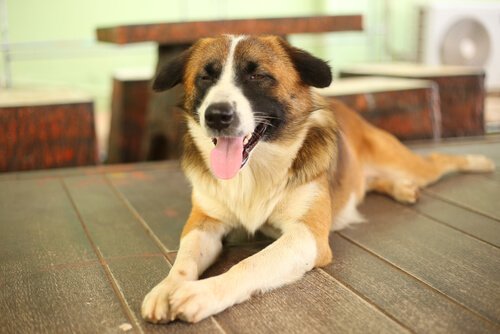Tips for Taking Care of a Blind Dog
4 minutes

Last update: 17 July, 2018
Whether by birth, sickness or age, a blind dog will greatly appreciate it if you follow the tips below. Likewise, it’s a good idea to remember that their senses of smell and hearing are very developed.
Over the years, your pet’s senses can deteriorate, especially his eyesight and hearing. Although you might think that having a blind dog is a problem, the truth is that his life can go on almost as it was before.
This happens as long as you’re aware of certain things, such as not leaving objects in places that can trip him. So, continue reading this article to learn what about some tips that can help you take care of him.
Recommendations for taking care of a blind dog
Of course, having a dog that has gone blind due to age or a disease isn’t the same as having one that was born being blind. Also, it’s different for a dog that has lived in your home since he was young isn’t that same as one that has just arrived.
No matter what, it’s important to make sure you offer him everything he needs, and that his life is as calm and comfortable as possible. Pay attention to these tips in order to take care of a blind dog:
1. Don’t overprotect him
An owner’s first reaction to a blind pet is protecting him from all harm. Unfortunately, most owners don’t’ know that this behavior can be harmful to the dog. Even if the animal doesn’t see, it can still live happily and independently.
Dogs aren’t aware of their new condition and adapt well by developing their other senses. At the same time, don’t forget that dogs use their sense of smell and hearing for many situations.
Therefore, allow him to do things such as playing, searching around, and sleeping wherever he wants. For your dog, life remains the same, except for one “detail”: blindness.
2. Make small changes to your home
Don’t rearrange all the furniture in your home to prevent the animal from bumping or tripping over things. Don’t forget that your dog has already lived a long time in your home and probably knows his surrounding by heart.

Of course, you should remove anything that might be dangerous to pet. However, everything else can stay in the same place. Try to keep things nice and tidy always and block off the stairs if you have any, to prevent him from falling down the steps.
3. Leave his things in the same place
Dogs need a routine, whether they are blind or not, in order for them to remain calm and be obedient. Therefore, you shouldn’t move his personal belongings: his bed, food dish, water bowl, toys, etc. This will help him get used to the location of his belongings and get his way through the house.
In addition, it’s good to play with him like you always did. For example, when you return from work, or while you are watering the plants. Remember, the animal doesn’t understand what has happened, and for him, everything is the same. So, don’t let him get depressed due to a lack of affection, attention or fun.
4. Take him to the park
One of the common mistakes owners of blind dogs make is never taking their dog outside of the house due to worrying for their safety. However, it’s very important for blind dogs to have contact with others in a park or open area.

On bright side, taking him out is perfect to change his environment, release energy, have fun, and be happy. To avoid any problems, walk him with a leash and pay attention when crossing the street. You will be his guide and his eyes at all times.
5. Stimulate his other senses
Having a blind dog is definitely a challenge. Sometimes you may not know what to do. You should teach him to use his senses of smell and hearing so he doesn’t depend on you too much. By further developing both senses, he won’t notice the difference between the past and his current condition.
Offer him objects with your scent on them, let him lie down on your blankets, talk loudly and clearly to him, and before petting him, let him know that you are close to prevent frightening him. Some people carry a noise-making object to let their dog known that they’re nearby.
This text is provided for informational purposes only and does not replace consultation with a professional. If in doubt, consult your specialist.